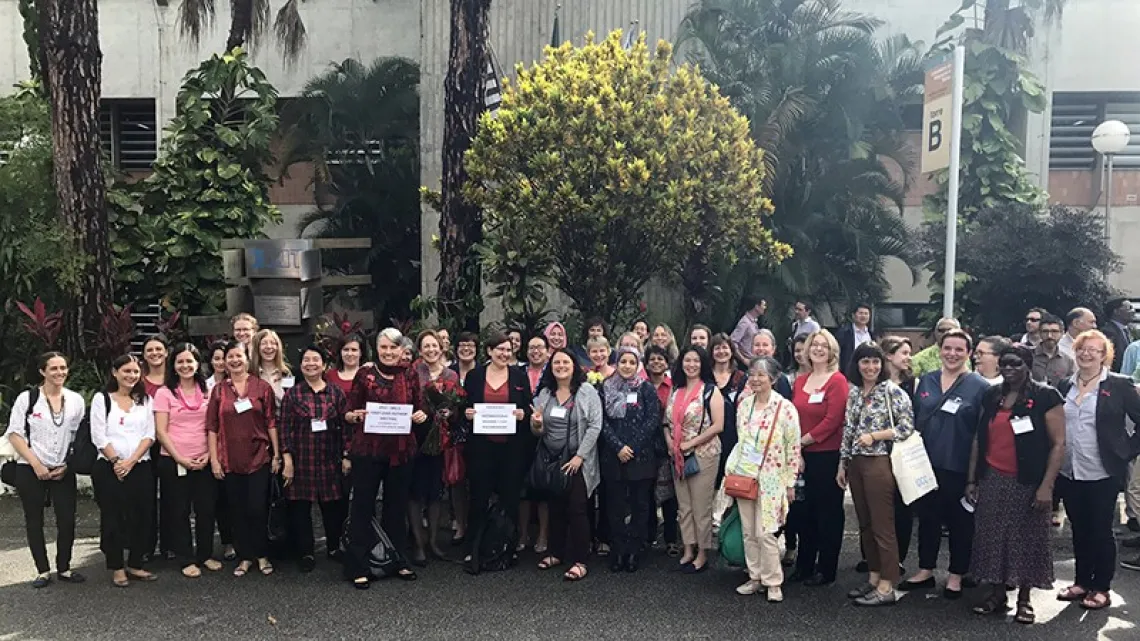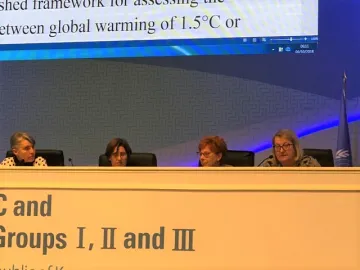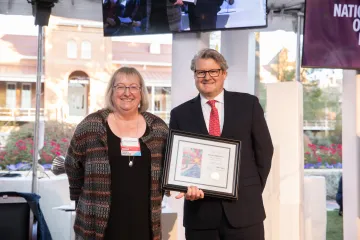Examining Gender Bias Within the Intergovernmental Panel on Climate Change

Women authors of the IPCC 1.5°C report in Brazil on International Women’s Day in 2017. Credit: Lincoln Alves
University of Arizona geographer Diana Liverman, Regents Professor in the School of Geography, Development & Environment, is lead author on a commentary titled “Survey of gender bias in the IPCC” in the Feb. 1, 2022 issue of Nature.

Diana Liverman (far right) at the IPCC 48th Session in Incheon, Republic of Korea in 2018.
In the piece, Liverman and other members of the Intergovernmental Panel on Climate Change (IPCC) Task Group on Gender, review the results of their survey of IPCC contributors to understand how they experienced gender bias and barriers during their work with IPCC. They concluded that the IPCC needs to do more to include the expertise and voices of women, even as numbers and policies improve.
“Fair representation and broad expertise are essential when considering an issue as global, urgent and cross-cutting as climate change,” the article stated. The authors also note that many studies reveal how diverse perspectives can improve decision-making and inspire a new generation of researchers.
Findings include:
- The number of women involved in writing the IPCC report have increased steadily, from 8% of authors in the first IPC assessment report in 1990 to one third in the current IPCC assessment team. Women have lower representation at senior levels.
- Women were 15% less likely than men to agree that everyone had equal opportunities to be nominated, speak, shape content or lead chapters.
- More women than men reported that they had observed someone else take credit for a woman’s idea (38% versus 24%) or had seen a women being ignored (52% versus 30%) or patronized (41% versus 27%).
- The survey highlighted the importance of other dimensions of diversity that intersect with gender, and can be barriers to inclusion, including ethnicity, race, nationality, religion, disability, and age.
- Survey respondents suggested ways to improve gender balance and also asked that IPCC processes be made more sensitive to family issues, including pregnancy, and child- and elder care.
The IPCC Task Force on Gender made various recommendations and the IPCC has established a gender policy and implementation plan.
“It is rewarding to see the work of our task group published and that IPCC has already made changes in response to our study,” Liverman said. “But it reminds us that gender bias continues and how important it is for us at the University of Arizona to train and support diversity in climate science. We have many women climate researchers and students here, and we must do our best to support, retain, and elevate them.”

Diana Liverman, pictured with SBS Dean JP Jones III, was recently honored for being elected into the National Academy of Sciences. Photo by Chris Richards/Alumni Association.
The IPCC, a group representing over 195 governments, was established by the U.N. Environment Programme and the World Meteorological Organization in 1988 to provide policymakers with regular scientific assessments concerning climate change.
Liverman, whose research focuses on the human dimensions of global environmental change, was involved in the IPCC assessments in 1995, 2001, and 2018 and is currently a review editor for the current assessment. She has been an active member of national and international advisory committees on global change, including the U.S. NAS Committee on the Human Dimensions of Global Environmental Change and the Earth Commission.

